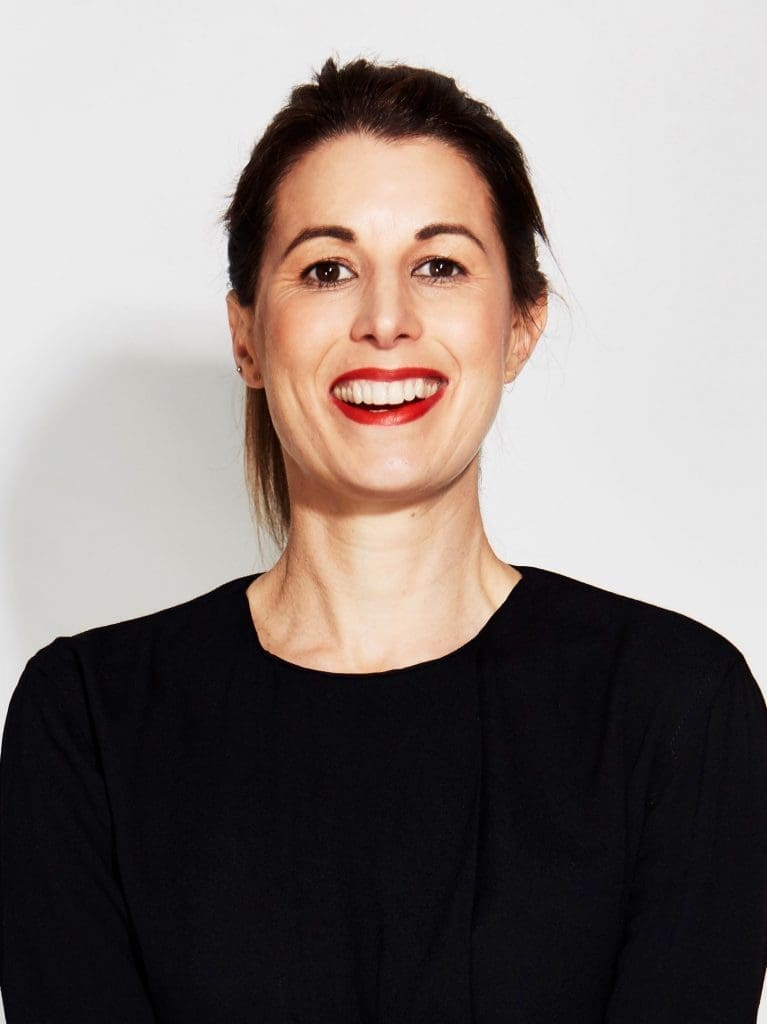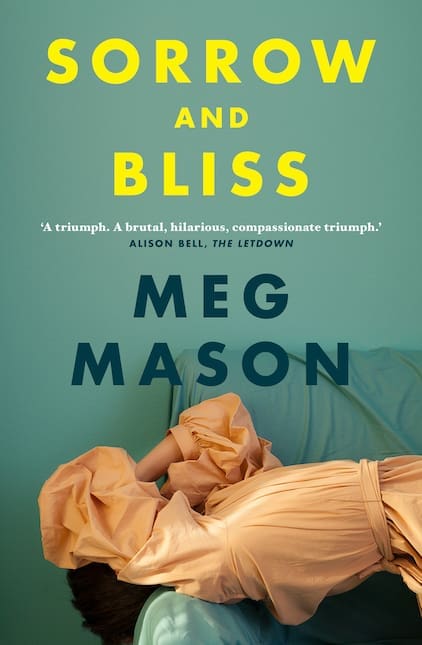New Zealand-born writer Meg Mason had her first daughter at 25 – she now lives in Sydney with her husband and two daughters. She’s written regular columns for GQ and The New Yorker, and is a regular contributor to Vogue, Marie Claire and Elle. Her first two books, Say It Again in a Nice Voice and You Be Mother were met with critical acclaim – her third, Sorrow and Bliss, is on shelves now and follows a woman named Martha, who knows something is wrong with her but she just doesn’t know what it is… Here she writes for Capsule about the fiction of motherhood.
When you are writing a novel, there are things that require labour, so many hours alone at your desk, writing and rewriting and rewriting a plot, striving for a sense of place, toiling over characters so they will – you hope – seem real and true and their story will speak in some way to readers.
Then, there are things you do by accident, and only realise you’ve done once you’ve finished, and only because a reader points it out.
I always intended Martha, the protagonist of Sorrow and Bliss, to be ‘difficult.’ From the beginning, I set out to write her as a complicated, hilarious depressive, a woman who is beautiful and awful, earnest and utterly self-sabotaging and if I achieved it, it was through a thousand drafts.
But I never meant for her to be unlikable, or realise that some readers would think of her that way, until the book came out and they began to mention it.
When the novel opens, Martha has just turned forty. She is underemployed, living in a house she dislikes, grappling with a mental illness that is undiagnosed despite the twenty years she has put into diagnosing it and just now, in the first scene which is her 40th birthday party, banging the final nails into the coffin of her own marriage to the kindest man who has loved her since they were teenagers.
Although I suppose she is – as my editor said after finishing it – ‘casually cruel’ towards her husband, her family, and sundry strangers, and some of her observations are a little bit sharp – I can forgive her because she is deeply unhappy, and unhappiness makes anyone mean. And she tries, she is always trying and never gives up fighting fires of her own lighting which makes her, to me and overall, an adorable, absolute nightmare of a human being.
Which is why I am torn by the idea of her being plainly unlikeable. Or the whole notion of likeability when it comes to female characters because it is such a chestnut in fiction – women have to be nice, someone we’d want to be friends with, if we readers are going to care about them; men get to be anything they like.
Some days, I feel like it doesn’t matter. If a reader, part way in, tells me they’re not liking her very much, I privately think fill your boots! Dislike yourself stupid! I promise, Martha will have turned you by the end. Once she’s done all her growing and accepting responsibility, once she finally comes of age at 41, you’ll want her as your bridesmaid.
Other days, reading a review that describes her as unlikeable, I want to be even more unlikeable in reply, pounding out a ‘GUESS WHAT, SHE WOULDN’T LIKE YOU ALL THAT MUCH EITHER AND ALSO, IT’S EFFECT NOT AFFECT, THE WAY YOU MEAN IT’ in the comments.
But then, but then! It works the other way too; readers see something in your novel, and respond to it, they tell you it moved them, and credit you for it even though this thing you have supposedly done was not on purpose.
Martha doesn’t have children and although it is a choice, she struggles with the exclusion and sense of otherness that comes with being a woman of her age who is not a mother. ‘They were mostly Patrick’s friends’ she says, of the guests at her birthday party. ‘I had lost touch with my own, from school and university and all the jobs I have had since, one by one as they had children and I didn’t and there was nothing left for us to talk about. On the way to the party, Patrick said if anyone did start telling me a story about their children, maybe I could try and look interested.’

I have two daughters, and because I was 25 when I had the first one, I’ve never really been an adult without also being mother but Sorrow and Bliss was not my effort to explore an opposite kind of life.
Still, an editor of a magazine I used to work for, now a friend, emailed me when she’d finished it and said ‘I don’t know how you know what it’s like to not have children when EVERYONE else does, but it’s absolutely like that. I don’t think the book is anti-motherhood at all, but it is an incredibly complex thing. And it is disheartening as a non-parent to so rarely have that experience reflected in fiction, so I am so happy you did!’
If I actually did, if she wasn’t just being nice, I am utterly delighted. Because, the more I thought about it, the more I saw what she meant. In contemporary fiction, where are all the principle characters who are women without children? I mean, women who just happen not to have them, who are not seeking to, in a book that is only aboutthe seeking, the longing, the biological clocks, the IVF journeys.
Instead of being funny, aspirational, functioning and whole, a woman who isn’t a mother is deranged by baby hunger (Girl on the Train), arcat lady (Eleanor Olphant), or a career woman who just thinks she doesn’t want children but will ultimately see the light, giving up her job for the total fulfilment of motherhood by the end (too many to list).
Why not! Truly! Why not? Motherhood is not the pinnacle of female achievement. It’s not the only story there is to tell about us. The journey towards motherhood, the experience becoming a mother can be interesting, but having children does not automatically make a woman interesting. Often, and probably in your real-life experience, it makes her the opposite, at least until she’s properly slept, showered, brushed-of-hair and back to reading the paper.
And in fiction, the juggle, the mummy wars, the puree-ing of organic vegetables, lost career, the marriage disintegrating because of the exhaustion of raising children have become such tropes that when I unwitting buy a novel and arrive at them, my impulse it to light it on fire. A woman, a female character, is interesting to me if she is interesting in herself. If she is complicated and difficult, it feels like a gift with purchase.
Maybe I am wrong, maybe there are so many brilliant novels with brilliant, child-free women at their centre, which are not solely about her fertility or lack thereof, and I will be DMd a list. But I am not sure I am.
There is a twist in Martha’s story which means that in writing her, I have not made up the lack. I haven’t created a literary icon for child-free women everywhere. But I hope, before they arrive at it, readers who also happen not to have children and feel unrepresented in fiction, will see something of themselves in her and be pleaserd. Their complexity, intelligence, beauty, humour. Their empathy and striving, their frequent kindnesses, fundamental worth – and occasional unlikeability which makes any woman, to me, real or fictional, desperately more likeable.
Sorrow and Bliss by Meg Mason (HarperCollins Publishers) RRP $35.00


SORROW AND BLISS / EXTRACT
When you are a woman over thirty, with a husband but without children, married couples at parties are interested to know why. They agree with each other that having children is the best thing they have ever done. According to the husband, you should just get on with it; the wife says you don’t want to leave it too late. Privately, they are wondering if there is something medically wrong with you.
They wish they could ask directly. Perhaps, if they can outlast your silence, you will offer it up of your own accord. But the wife can’t resist – she has to tell you about a friend of hers who was told the same thing but as soon as she gave up hope … the husband says bingo.
In the beginning, I told strangers I couldn’t have children because I thought it would stop them from continuing beyond their initial enquiry. It is better to say you don’t want them. Then they know straight away that there is something wrong with you, but at least not in a medical sense. So the husband can say, oh well, good for you, focusing on your career, even if, to that point, there had been so little evidence of a career being focused on. The wife doesn’t say anything, she is already looking around.
*
A new administrator joined Patrick’s hospital last year, in May. She had moved to Oxford for the lifestyle but her husband, a psychiatrist, was commuting back to London because he had just got rooms on Harley Street and, she said, we all know they’re like hen’s teeth.
I met her at a charity dinner for a cause I can’t remember, even though the purpose of going was to have our awareness raised. She asked me what I did and I told her I created content so people could consume it. It was a job I had taken auxiliary to the funny food column, which I didn’t mention in case she read Waitrose magazine and realised I was that writer she hated.
I said, ‘I also consume content, in a private capacity. Not content of my own creation in that instance, obviously. But either way, I am very much a part of the problem.’
She laughed and I went on to tell her that whenever I was out and I saw a mother who was on her phone, I worried that it was my content she was consuming instead of looking into her child’s eyes.
She said, ‘It certainly seems like we’ve lost the ability to not be on our phones, doesn’t it?’ and sounded wistful.
‘But I’m sure at the end of our lives we will all be thinking, if only I’d consumed more content.’
She laughed and touched my arm and whenever, for the remainder of our conversation, she was imparting some information about herself, seeking to emphasise a point or making some observation, she would do the same – touch my arm, and if I said something she thought was funny, she would softly grip it. I liked her so much for that reason and because, although she asked me questions beyond what I did, she did not ask me if I had children.
*

